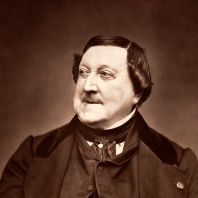Gioacchino Rossini
composer
Gioacchino Rossini was the most successful opera composer in the first half of the 19th century. His works were received with great enthusiasm everywhere. However, his working methods made opera directors very nervous – Rossini used to compose his overtures on the eve of the respective premiere: “Nothing stimulates inspiration more than necessity: the presence of a copyist waiting for your work and the urging of an anxious impresario who is tearing his hair out in clumps. In my day, all impresarios in Italy were bald by the age of thirty.”
21 years before Giuseppe Verdi, on 29 February 1792, Gioacchino Rossini was born in Pesaro, the son of a musician and an opera singer. He received his first music lessons from his parents before training under Don Giuseppe Malerbi, the chapel master of the local collegiate church. From 1804, the young Gioacchino appeared as a singer and “maestro di cembalo” and composed six “Sonata a quattro”, among other works. After the family moved to Bologna, Rossini became a pupil at the Liceo Filarmonico, the first state conservatory in Italy. From 1808 onwards, Rossini composed numerous church works until he – supported by good contacts in the contemporary theatre scene – turned to writing for the stage: in autumn 1810, he made his debut with La cambiale di matrimonio in Venice, after which he was contracted for the following year – and subsequently for three more seasons. His debut at La Scala in Milan in 1812 with the comic opera La pietra del paragone was a triumph and resulted in more than 50 further performances of the work. A favourite of audiences, Rossini enjoyed many other successes with commissions from Rome and Naples, which were soon followed by sensational performances in Vienna, Paris and London. At the height of his fame, he moved to the French capital in 1824 to take up the post of Directeur de la musique et de la scène at the Théâtre Royal Italien. After losing his posts as a result of the July Revolution in 1830, Rossini retired from the stage and devoted himself to his second great passion: cooking. Nevertheless, he continued to compose numerous Péchés de vieillesse, the so-called “sins of old age”, and held weekly musical soirées. In 1868 – the year in which the 500th performance of Guillaume Tell was given at the Paris Opéra in February – Rossini died on 13 November at his country estate in Passy near Paris.